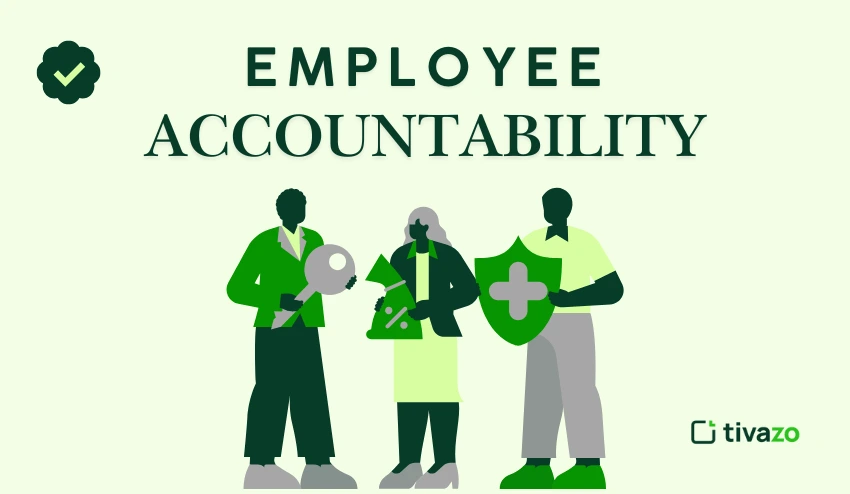Employee accountability is one of the biggest determinants of workplace productivity and performance. Organizations prosper when employees apply ownership over their responsibilities, deadlines, and collaboration. However, accountability is difficult for many employees to uphold in today’s fast-paced working environment. This is where a time tracking tool can help.
Smart time tracking software can provide businesses with transparency, cut down wasted time, and improve employee accountability. In this blog, we’ll survey what employee accountability is, why it matters, and how time tracking can improve accountability in your workplace.
The meaning of Employee Accountability
Employee accountability means that individuals are responsible for their actions, decisions, and results in the workplace. Accountability is more than just doing what is asked – accountability also means:
- Owning up to your assigned responsibilities.
- Meeting deadlines.
- Providing quality work without the need for management supervision.
- Honesty about their challenges, reaching out for help, and providing progress updates.
- Being willfully honest while supporting team objectives.
When employees are accountable, they help to create a good workplace culture, improve productivity, and long-term business development.
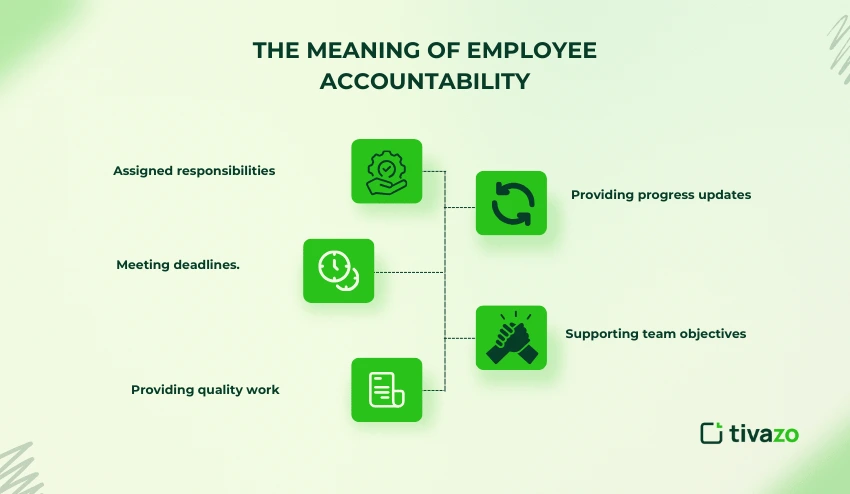
Why Does Employee Accountability Matter?
Without accountability, you may see:
- Missed deadlines.
- Decreased productivity.
- Confusion over roles and responsibilities.
- Team tensions or conflict.
- Decreased MoraLe.
- Increased mistakes and rework.
- Wasted resources and inefficiency.
Conversely, organizations with a focus on employee accountability can expect:
- Better task management.
- Better engagement and trust.
- Better teamwork and collaboration.
- Better job satisfaction.
- Better communication with all teams.
- Better performance and more consistent results.
- Better ownership and responsibility.
- Better retention because employees feel valued and responsible.
With a strong focus on accountability, employees and organizations can reach their full potential while maximizing a productive and positive work environment.
How Does Time Tracking Impact Accountability?
Time tracking tools fundamentally promote accountability. As employees track how their hours are spent throughout the workday, they become more aware and cognizant of how they are using their time. Such visibility invites responsible behavior, and it will help keep employees aligned with organizational goals.
Specific Time Tracking Benefits for Accountability:
1. Transparency
Everyone in an organization can see how team members spend their time on projects, including unproductive time. Transparency breeds trust and openness.
2. Ownership
Once an employee knows their work can be measured, they tend to want the ownership and accountability that goes with it.
3. Factual vs. Assumptions
Managers can rely on data (not assumptions) when making accountability decisions, which can lead to a fairer performance review.
4. Insights
Time tracking contributes to organizational insight. This provides examples of procrastination, discovers areas of lack of efficiency, and identifies tasks that should be on the high-priority list.
5. Goals
Teams work to achieve objectives, and an employee can see how their time fits into the team’s objectives and the organization’s objectives more specifically.
6. Feedback
Provides feedback based on facts with no emotion, making constructive discussions and improvement doable.
7. Motivation
Employees are engaged knowing their work is monitored, and want to stay engaged proactively, versus reactively, meeting deadlines.
Organizations that adopt a time tracking methodology into their everyday way of working will develop a culture of accountability, reinforcing practices that positively influence a company’s productivity and effectiveness, team collaboration, and other approaches towards results.
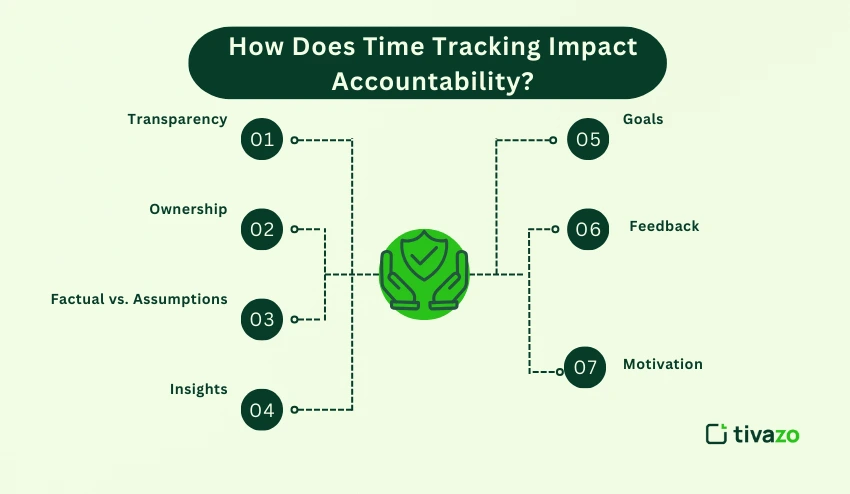
How to address accountability challenges using time tracking software like Tivazo
Tivazo’s time tracking software can help organizations overcome common accountability challenges, such as missed deadlines, poor time management, and a lack of ownership. By taking action to gather knowledge of how much time employees spend on certain tasks, Tivazo facilitates responsible behavior and helps promote a culture of transparency.
How Tivazo seeks to address accountability issues
| Accountability Challenge | How Tivazo Addresses It |
| Procrastination | Tracks work hours to limit time wasted on distractions |
| Missed Deadlines | Provides real-time updates to project progress |
| Lack of ownership | Responsibly assigned tasks with visible ownership |
| Poor use of time | Generates reports for enhanced productivity |
Tivazo solves these chronic accountability issues, while also providing these benefits to managers too – identifying workflow bottlenecks and understanding which tasks consume the most time. Employees will also acquire knowledge about how they are productive and adjust, as they will more effectively set their priorities. Tivazo also provides organizations with customizable dashboards and automation reminders so each team can account for workload more consistently, resulting in fewer errors and increased effectiveness overall.
How Can You Make Accountability A Part Of Your Time Management?
Making accountability part of your own time management means setting goals that are doable and actually doing them. Here are some things to do:
- Come up with clear deadlines for each task.
- Use to-do lists to prioritize tasks.
- Keep track of your time daily to keep an eye on how much you are or aren’t doing.
- Review your progress each week to keep yourself accountable.
When employees can hold themselves accountable for how they manage time, the efficiency they can provide to the workplace becomes staggering.
Strategies for Promoting Employee Accountability
Promoting accountability isn’t about control; it’s about empowerment. Employees who feel trusted and supported will be more motivated to take responsibility for their work and meet their expectations.
Here are some other strategies:
- Clearly communicate expectations: Outline individual roles, responsibilities, and goals. Employees need to know what is expected.
- Recognize employees’ accomplishments: Recognize success, both large and small, to inspire employees to stay accountable.
- Offer constructive feedback: Guide employees in a supportive way so they can improve, while not feeling discouraged.
- Use time tracking tools to aid transparency: The use of tools to monitor work (like Tivazo) will give employees more insight into how their work time helps the team achieve its goals.
- Support self-discipline and ownership of work: Encourage employees to establish their own goals, keep track of their assigned tasks, and reflect on their own progress toward goals.
- Model behavior: Managers should show accountability in their work so staff can see accountability exampled in action.
- Facilitate teamwork: Teamwork with ownership should promote accountability as a team.
- Provide resources and support: Help employees have the materials and training to get the work done quickly.
By creating a balance of support and accountability in the workplace, your organization can foster a culture where accountability evolves naturally.
What is accountability tracking?
Accountability tracking is the act of evaluating how tasks, projects, and commitments are performed to ensure people are meeting expectations. It is more than asking if something has been completed—it measures how efficiently, accurately, and responsibly that work is performed, which is a key element for accountability in employees. This can help organizations identify where performance may have gaps, give recognition to high performers, and support employees who may be struggling, which builds a better foundation of accountability for all employees.
Time tracking software lays the groundwork for accountability tracking with:
- Work logs: The level of detail that depicts completed tasks, time spent, and progress overall.
- Time usage reports: Outlines where employees are spending their work hours across all projects and tasks.
- Productivity insights: Metrics and analytics that outline where employee strengths and improvement areas are.
By being able to implement accountability tracking, businesses can ensure expectations are clear, measurable, and achievable, receiving further buy-in from their employees. Additionally, they give the opportunity for managers to conduct data-driven, thoughtful evaluations, improve workflow possibilities, and align team efforts to organizational aspirations. Ultimately, in the long run, accountability tracking yields higher productivity, lower errors, and greater employee engagement levels as it works as a crucial piece of workforce management in the contemporary world.
How to Create a Culture of Accountability with Time Tracking
Creating a culture of accountability is more than tools; it’s about fostering a mindset of employee accountability. Time tracking is a mechanism that can support this. Time tracking provides visibility into who is responsible for what task to help reinforce employee accountability at every level.
- Creating visibility: Everyone on the team knows who is responsible for which task.
- Increasing collaboration: Teams stay aligned on a shared goal, which helps everyone remain accountable.
- Promoting equity: Everyone’s workloads look equitable, so responsibility is clear on who does what.
- Recognizing productivity: Comes easily when both low and high performance are easily measurable, making it easier to create accountability across the organization.
When time tracking is executed regularly, it makes employee accountability a natural component of everyday workflows, not something that seems forced.
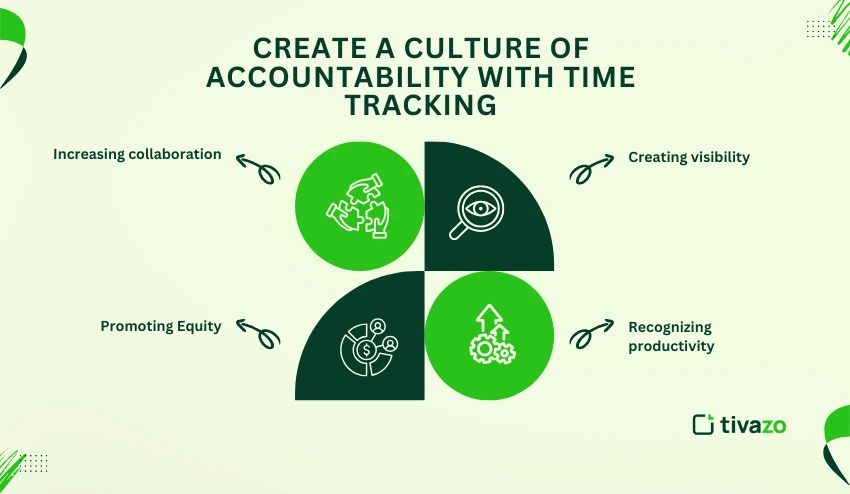
How to Monitor Employee Timekeeping
Timekeeping is crucial for employee accountability. It gives both employees the responsibility of tracking their own hours to show how they are spending their time, and the employer the information needed to make a fair evaluation of performance. Here are some tips:
- Use automated tools: When employees manually keep time, there are human errors involved, and automation with tools like Tivazo can help ensure accuracy and provide employees with checks in accountability.
- Track project time separately: Keeping a tally of which tasks take the most time will help an employer evaluate how they place the workload, their workload distribution.
- Create weekly reports: It will also help employers with more information for making the decisions they have to make, and monitor employee accountability across various teams.
- Prompt and thorough: Employers should encourage employees to log their hours daily so they are accountable to themselves.
Finally, when managers review the employees’ timekeeping data regularly, they see who the top performers are, identify blocks to productivity, and provide feedback promptly; doing this consistently is a way to develop a culture of employee accountability, fluency in managing their time well, and a higher level of productivity and effectiveness as a team.
10 Tried and Tested Approaches to Elevate Employee Accountability with Time Tracking
- Establish specific goals and deadlines
- Use Tivazo for employee time tracking.
- Share status reports with your teams.
- Recognize and reward those who take accountability.
- Provide data-driven feedback.
- Encourage self-management and accountability with personal dashboards.
- Make accountability relatable to company values.
- Use time tracking for objective performance reviews.
- Manage the distribution of employee workloads
- Regularly reassess your process for accountability.
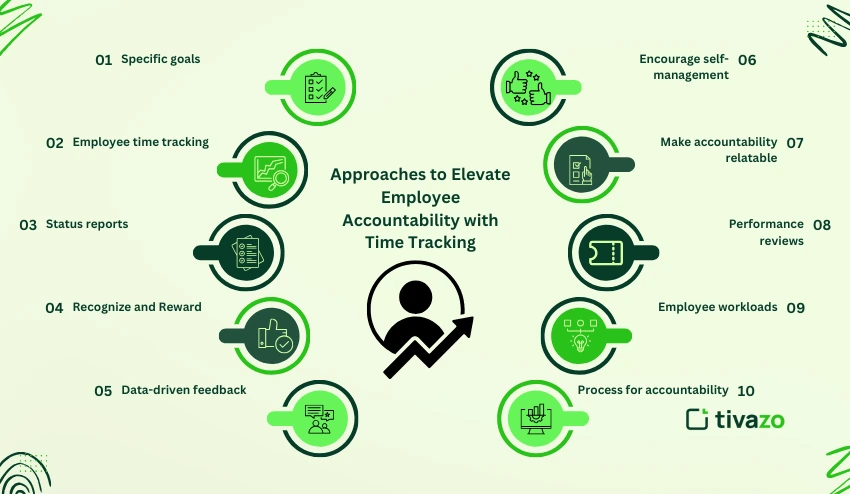
Conclusion
If organizations act consistently on these types of approaches, they will create a workplace environment where employee accountability is a core value that brings about higher productivity, collaboration, and ultimately business success in the long run.
Employee accountability is more than just tracking work tasks. It’s about developing trust, personal ownership, and creating a culture of productivity. Time tracking tools like Tivazo enable both employees and managers to maintain alignment and drive performance toward business goals. Employee accountability becomes quantifiable and actionable through a time tracking tool, a time tracking tool allows for visibility on how work actually gets done. Having this level of visibility helps employees and their team members understand the impact of their work.
The effect might take some time, but higher levels of commitment, lower error rates, and greater consistency with organizational goals follow. Having time tracking become institutionalized behavior builds a sustainable network where accountability can support performance, trust, and business returns.
